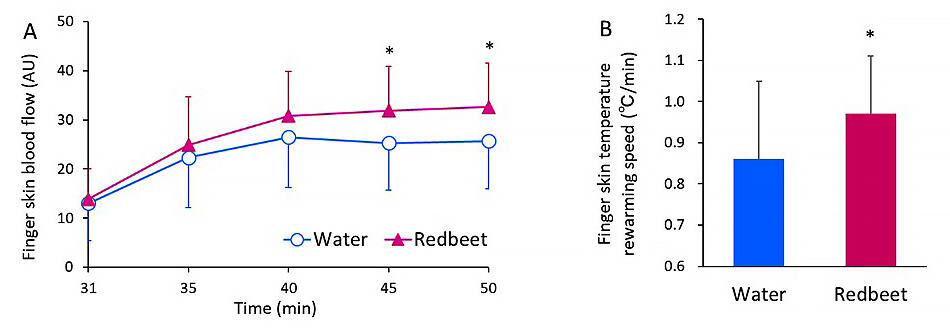In the coming months, cold weather will gradually intensify, and it will become a difficult season for individuals who are sensitive to the cold. Against that background, Associate Professor Hitoshi Wakabayashi of the Faculty of Engineering, Hokkaido University, along with Lecturer Yasuko Sakihama and Professor Makoto Hashimoto of the Graduate School of Agriculture, Hokkaido University, in collaboration with Dr Martin J. Barwood of Leeds Trinity University, have found that ingesting a red beet (beetroot) beverage can quickly warm a person's cold fingers. Moreover, they also found that red beet intake was more effective for individuals who tended to be colder. The findings were published in the European Journal of Applied Physiology.

* indicates significant difference between water and red beet conditions (p<0.05).
Provided by Hokkaido University
Red beet has recently been attracting attention as a superfood for its blood pressure-lowering and antioxidant functions due to the ingredients it contains, and the cultivation of red beet is being promoted in Hokkaido. When the nitrate contained in red beet is ingested, it is converted into nitric oxide in the body, which is known to lower blood pressure and promote blood flow through the vasodilating (blood vessel widening) effect of nitric oxide. The research group thought that it might be possible to utilize this blood flow-promoting effect of red beet to improve coldness in people's peripheries, such as in their fingers, and conducted experiments with humans.
20 healthy adult males were subjected to a two-condition experiment in which they consumed either water or a red beet beverage in a random order. Each subject consumed 140 milliliters of water or the red beet beverage, then rested in a sitting position for 120 minutes, which was then followed by immersing their hands in 8℃ water for 30 minutes to cool their fingers. After completing the cooling, the participants were given a 20-minute recovery period at a room temperature of 27℃.
Skin blood flow and skin temperature at the fingertips were measured during the experiment, and changes over time in each index were compared between the two conditions. Skin temperature recovery speed (℃/min) during the recovery interval was also determined and compared between the two conditions. The change over time in the subjects' fingertip skin temperature showed that those who were slow to recover after drinking water showed accelerated recovery when they drank the red beet beverage. Individual differences were observed in the effect the red beet beverage had on skin temperature recovery, with those who were slower to recover their skin temperature after drinking water (those with a strong tendency to be cold) showing a more pronounced acceleration in skin temperature recovery after drinking the red beet beverage. Skin temperature recovery speed from one to 20 minutes of recovery was faster after drinking the red beet beverage than after drinking water. It was also found that drinking the red beet beverage promoted an increase in fingertip skin blood flow during the post-cooling recovery interval.
On the other hand, no differences in skin blood flow or skin temperature during cooling were observed between water and the red beet beverage, suggesting that the vasodilation effect from drinking the red beet beverage on peripheral vasodilation does not occur during strong cold stimuli. In addition to improving the thermal comfort of people who feel cold in their office or living environment, the food functionality of red beets may be utilized when working outdoors in cold weather or when engaging in winter sports, and there are high expectations for practically applying and disseminating them through future practical research.
Journal Information
Publication: European Journal of Applied Physiology
Title: Influence of acute beetroot juice supplementation on cold-induced vasodilation and fingertip rewarming
DOI: 10.1007/s00421-022-05071-6
This article has been translated by JST with permission from The Science News Ltd.(https://sci-news.co.jp/). Unauthorized reproduction of the article and photographs is prohibited.




